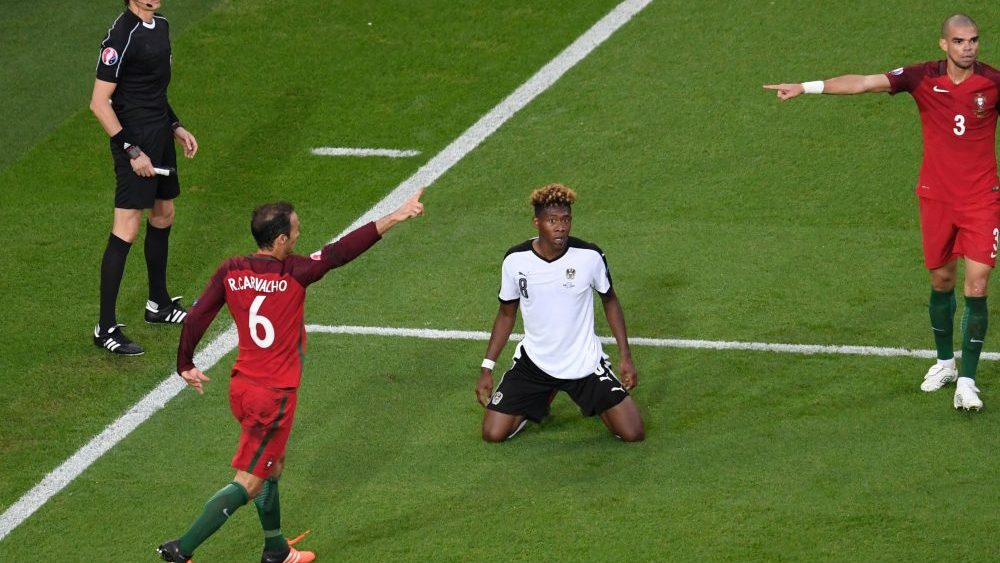Alaba’s big moment
In Bordeaux the minds were split. In a small restaurant where several Austrian fans sat down on a table to watch the game of Portugal against the underdog from Iceland, a discussion started about the small football disaster they had to experience in the afternoon. The 0-2 against Hungary was an imaginably bad start to the first Euros tournament Austria have qualified for. Instead of furtherly warming the excited red-white fan’s soul, the team of Marcel Koller created a new ice age. Positive expectations were drowned by resignation.
Poor from a Bayern perspective
There they sat with their red shirts with the proud eagle on the chest and argued about their team. Arnautovic? As expected, always good going forward but non-existent at tracking back. Harnik? Pfft, just like his games for Stuttgart. Dragovic? He’ll never get out of Kiev like this. Whether it was Tyrol, Vienna or Upper Austria, the opinions on the majority of the squad were similar. Not with David Alaba though, who had a solid game from an Austrian point of view, at least he fought and hit the post with his early shot. The delegation from Munich was shaking their heads.
No, the David Alaba that played against Hungary wasn’t taken seriously from a Bayern perspective. Hectic in his actions, insecure, in parts with appalling misplaced passes. This really wasn’t the Alaba that regularly stands out between Thiago and Boateng. And in the second game of the group stages nothing changed: The Austrians managed a draw against Cristiano Ronaldo, fought well, however Alaba saw a big part of the game from the bench. Disappointed in his performance he was subbed off by manager Marcel Koller in the second half. The playmaker position, he took over from the injured Zlatko Junuzovic, didn’t fit him. Suddenly the game wasn’t in front of Alaba anymore, instead he was in the middle of it and lost the ball which set up in counters.
A role in modern football
When the “Standard”, Austria’s most renowned newspaper, writes about David Alaba’s performance that his manager finally ended his “suffering” after 65 minutes, the alarm bells are ringing. In the alpine republic a lot of footballers were and will be criticized in the media, Marko Arnautovic or Marc Janko could tell you a story or two. David Alaba can do as he pleases – he is and will be a national hero. Someone who is able to win athlete of the year twice in a winter sports country with a certain Marcel Hirscher around, who drives the skiing world into the ground, has to have something special. As a matter of fact, with David Alaba the Austrian fans have a feeling they’re playing a role in modern football where individual players are viewed as icons so much. “Our David” plays for FC Bayern they say, and for them incredibly well too. He doesn’t have to hide from the rest of the world. No, he’ll take the ball off the rest of world with his brilliant positional play and initiate the counter attack.
So in Austria there was definitely a feeling that something could be done in France. The team of internationals unquestionably has a certain level and lead by Bayern star Alaba surely they could reach the last sixteen, right? Lack of tournament experience? Nah, David plays in a Champions League semi-final every year, a European Championship doesn’t faze him. Most supporters’ jaws dropped when it showed in the opening game against Hungary that the high-altitude flight could end rather early. And the leader disappointed, seemingly impressed by the Euros limelight.
Subjunctive – luckily
The Euros, which were thought to be the arrival event of Austria in the European top teams, could end up in a group stage exit, worst case scenario with one point and become a huge disappointment. And David Alaba, who wanted to show the entire world that he can lead the midfield of his national team would be the tragic figure that has to deal with large criticism for the first time in its career. He would be the face of defeat and simultaneously feel pressure to become the architect of a new team for the World Cup 2018. His task would be, possibly as captain and successor of Christian Fuchs, that Austria doesn’t question everything. That the ÖFB still continues its youth work and the public still trusts the euphoria for football.
All of this sounds like a massive mountain that is ahead of the 23-year old. However David Alaba is lucky because the paragraph atop is written in subjunctive. If the 23-year old gets a grip on his previous low performance level against Iceland, he could make another big step in his already splendid career: The national team would reach the expectations and his role as a leader. The crowd that would celebrate David Alaba frenetically would also forget his poor displays against Hungary and Portugal quicker than it could say “Kaiserschmarrn”. And the regulars’ table which bravely defended him in Bordeaux would feel vindicated and happily plan the journey to Moscow in two years.
David Alaba and his national team have meaningful 90 minutes ahead of them.









